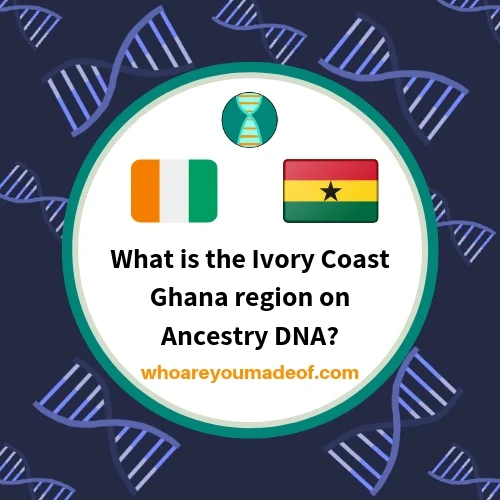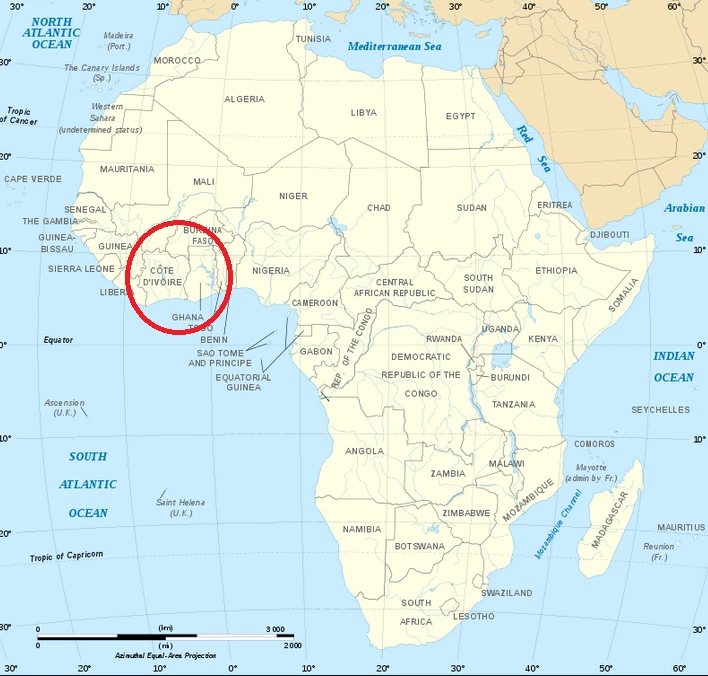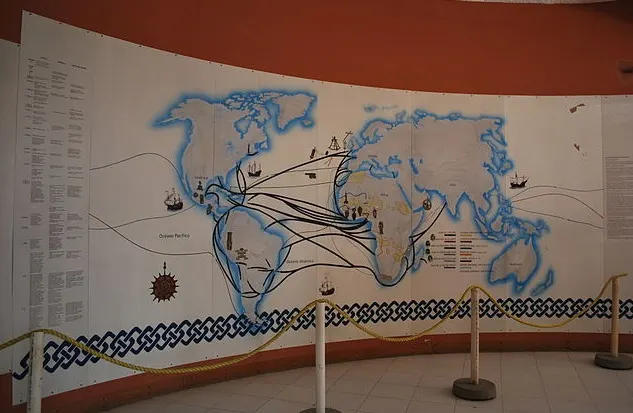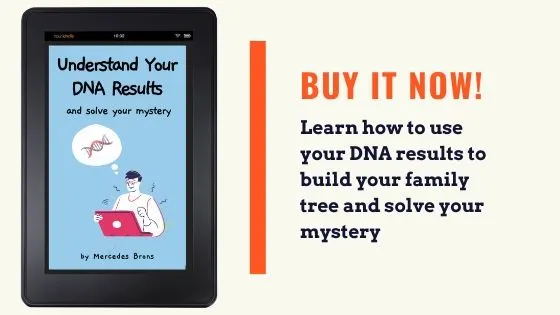Did you get the Ivory Coast Ghana region on Ancestry DNA? In this post, learn more about this result, including how you might have inherited it and how to trace your Ivory Coast Ghana ancestry.

I set out to learn about the Ivory Coast Ghana region on Ancestry because my oldest daughter got this region on her Ancestry DNA results. In the image below, you can see her Ivory Coast Ghana results:

While she only received a small percentage of DNA from this region, she felt is was important to learn as much as she can about her heritage. Even though most of her African heritage is from Cameroon, Congo, and Southeast Bantu peoples, Senegal, and Mali, she believes (like I do!) that every single ancestor that contributed to our DNA deserves equal time and attention.
I hope that our exploration of this region in this article helps you, too.
Where is the Ivory Coast Ghana DNA region?
The Ivory Coast/Ghana DNA region on Ancestry DNA is located primarily in the countries of the Ivory Coast and Ghana, which can be seen in the red circle in the map of Africa below:

Even though DNA from this region is most commonly found in Ghana and Ivory Coast, it can also be found less commonly in the following countries, according to Ancestry DNA:
(some of these countries have their own corresponding DNA regions - if available, you can click to the country-specific article)
Interesting fact: The country of Ivory Coast of Africa got its name during its time as a French protectorate, pre-colonization. In French, which is the official language of the country, it is known as Côte d'Ivoire. The name comes from the top item of export during that period (ivory).
So What is Ivory Coast Ghana DNA?
Humans have been living in the Ivory Coast Ghana DNA region for at least 12,000-17,000 years. Archaeologists have discovered evidence of old settlements, including tools and cooking equipment and suggest the origin of these items is the Neolithic period.
It's possible that there have been settlements in the region for even longer, especially considering that genetic studies of mitochondrial DNA indicate the population in Western Africa branched off between 55,000-90,000 years ago.
Over the course of the millennium, the areas that we now know as Ivory Coast and Ghana were settled by different groups of people with various ethnic origins.
For example, before the arrival of the French in Ivory Coast, at least three distinct political divisions existed: Gyaman, Kong Empire, and Baoulé. Political agreements, battles, and colonial rule shifted control of the Ivory Coast Ghana region of Africa, and formed it into what it is today.
There are dozens of languages spoken in Ivory Coast and Ghana, even though the official languages of these countries are French and English, respectively.
Living within Ivory Coast and Ghana (officially, the Republic of Ghana), are more than a dozen ethnic groups. The largest of such groups include the Akan, Gur, Northern Mandes, and Mole-Dagbani peoples.
How did I get Ivory Coast Ghana in my DNA Results?
Depending on where you live and your family's history, the way in which you inherited your Ivory Coast Ghana DNA ethnicity will vary. I hope that you are interested in learning about your Ivory Coast/Ghana ancestors, and that this information helps you determine how best to go about your research.
From my experience in genetic genealogy, there are a few main ways that people who live in the United States may have inherited DNA from the Ivory Coast Ghana region.
Is your Ivory Coast Ghana DNA from recent ancestors directly from the region?
Some people may have ancestors who are recent immigrants to North America from countries within the Ivory Coast/Ghana region. Theses most likely would be people who came to the United States from Ghana, Ivory Coast, or an adjacent region, in the 20th century.
Many people who have inherited DNA from the Ivory Coast/Ghana region are descended from individuals counted among the at least 12.5 million people who were removed by force from their homeland and taken to North and South American as victims of the trans-Atlantic slave trade.
Most people who were taken from West Africa to be sold into slavery ended up in South America and the Caribbean, but a considerable number became victims of slavery in the United States (about 400,000) and Mexico (200,000).
There are no clear sources that can determine exactly where every enslaved individual taken to the United States would have called home (especially with modern political boundaries), but we do know that approximately 25% may have come from the region that encompasses Ivory Coast and Ghana.
Many people in Latin America might have ancestry from Ivory Coast and Ghana
Many people with DNA from the Ivory Coast/Ghana region might know that their recent ancestors immigrated to the United States from countries in the Caribbean or South America. Thus, their DNA from this region could have been inherited from descendants of people who were removed from the Ivory Coast/Ghana region and taken to any number of possible places within the continents.
For example, I've mentioned before on my posts that my daughter's father is from the Costa Chica region of Mexico. This is a part of Mexico that is well-known for its afro-mestizo roots. My daughter's father immigrated to the United States, and of course, my daughter was born here.
This is a good example of how DNA from the Ivory Coast/Ghana region (or any other region, really) can come to the US indirectly.
In the photograph of a map below, you can see the routes the slave trading ships took. There were ports (and people) all over North and South America that participated in the cruelty of the slave trade.

By AlejandroLinaresGarcia - Own work, CC BY-SA 3.0, https://commons.wikimedia.org/w/index.php?curid=19063187
Can you trace your Ivory Cost Ghana ancestors?
Researching ancestors from the Ivory Coast Ghana region can present some challenges, but it's very possible that you can learn a great deal.
The first step? Build a family tree, and include what you already know about your family history in your tree.
Next, you'll want to try to find records about your grandparents, great-grandparents, and great-great grandparents. Depending on where these ancestors were born, you will face different obstacles.
If you have recent ancestry from Ivory Cost or Ghana, you might find these links useful:
For those who are African-American and researching Ivory Coast/Ghana heritage, you might find information useful via this link:
Don't forget to read about the local history of the place where your ancestors lived, whether it was in the United States or a Latin American country. Any little detail can give you ideas about where your ancestors may have come from, or help you learn about what their lives were like.
Conclusion
I hope that this post has helped you understand a bit more about the Ivory Coast Ghana region on Ancestry DNA.
If you have any questions about something that you read in this post, or if you would like to share your own experience researching this region, I would love to hear from you in the discussion below.
Thanks for stopping by today!


Dollie
Thursday 10th of August 2023
My mother 17% Ivory Coast/Ghana
Stacy weigert
Friday 12th of June 2020
Looking for more info how to trace back my heritage from Ghana. I'm 1% like your daughter. Thanks